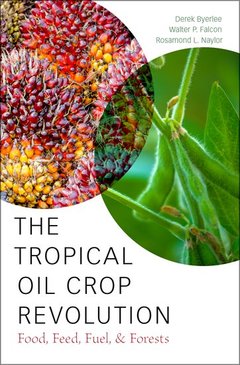The Tropical Oil Crop Revolution Food, Feed, Fuel, and Forests
Langue : Anglais
Auteurs : Byerlee Derek, Falcon Walter P., Naylor Rosamond L.

Over the last two decades global production of soybean and palm oil seeds have increased enormously. Because these tropically rainfed crops are used for food, cooking, animal feed, and biofuels, they have entered the agriculture, food, and energy chains of most nations despite their actual growth being increasingly concentrated in Southeast Asia and South America. The planting of these crops is controversial because they are sown on formerly forested lands, rely on large farmers and agribusiness rather than smallholders for their development, and supply export markets. The contrasts with the famed Green Revolution in rice and wheat of the 1960s through the 1980s are stark, as those irrigated crops were primarily grown by smallholders, depended upon public subsidies for cultivation, and served largely domestic sectors. The overall aim of the book is to provide a broad synthesis of the major supply and demand drivers of the rapid expansion of oil crops in the tropics; its economic, social, and environmental impacts; and the future outlook to 2050. After introducing the dramatic surge in oil crops, chapters provide a comparative perspective from different producing regions for two of the world's most important crops, oil palm and soybeans in the tropics. The following chapters examine the drivers of demand of vegetable oils for food, animal feed, and biodiesel and introduce the reader to price formation in vegetable oil markets and the role of trade in linking consumers across the world to distant producers in a handful of exporting countries. The remaining chapters review evidence on the economic, social, and environmental impacts of the oil crop revolution in the tropics. While both economic benefits and social and environmental costs have been huge, the outlook is for reduced trade-offs and more sustainable outcomes as the oil crop revolution slows and the global, national, and local communities converge on ways to better managed land use changes and land rights.
Derek Byerlee is a Visiting Scholar at Stanford University, Adjunct Professor at Georgetown University, and Editor-in-Chief of the Global Food Security journal. He previously held senior positions in the World Bank and the International Maize and Wheat Improvement Center and has served on many international advisory bodies. His recent work has focused on inclusive agribusiness, large-scale farming, land use change and deforestation, and land governance. Walter P. Falcon is Farnsworth Professor of International Agricultural Policy (Emeritus) and Senior Fellow at Stanford University. He is a specialist on food policy, especially in Asia, and has also played important leadership roles in international agricultural research organizations. He holds a PhD from Harvard in economics and is the winner of numerous scholarly and public service awards. Rosamond L. Naylor is the William Wrigley Professor of Earth Systems Science and the Director of the Center on Food Security and the Environment at Stanford University. She completed her graduate degrees at the London School of Economics and Stanford's Food Research Institute, and Naylor's research focuses on the economic and policy dimensions of global food systems. She and her students execute field research projects focused on food security and environmental issues related to agriculture and aquaculture in several countries. She is an advisor to Stockholm's Beijer Institute, the Aldo Leopold Leadership Program, The Nature Conservancy, and the Aspen Global Change Institute.
Date de parution : 12-2016
Ouvrage de 304 p.
23.9x16 cm
Thème de The Tropical Oil Crop Revolution :
© 2024 LAVOISIER S.A.S.
